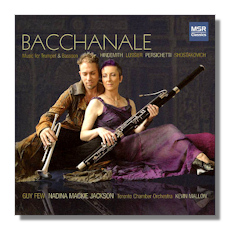
The Internet's Premier Classical Music Source
Related Links
-
Hindemith Reviews
Persichetti Reviews
Shostakovich Reviews - Latest Reviews
- More Reviews
-
By Composer
-
Collections
DVD & Blu-ray
Books
Concert Reviews
Articles/Interviews
Software
Audio
Search Amazon
Recommended Links
Site News
 CD Review
CD Review
Bacchanale

Music for Trumpet and Bassoon
- Mathieu Lussier:
- Concerto for trumpet, bassoon & strings
- Spring Lullaby
- Bassango
- Bacchanale
- Paul Hindemith: Concerto for trumpet, bassoon & strings (1949-52)
- Vincent Persichetti: The Hollow Men
- Dmitri Shostakovich (arr. F. Jackson):
- Jazz Suite #1 – Waltz
- Jazz Suite #2 – Dance
Nadina Mackie Jackson, bassoon
Guy Few, trumpet
Toronto Chamber Orchestra/Kevin Mallon
MSR Classics MS1021 60:55
Summary for the Busy Executive: Fine performances, odd programming.
A Canadian production, Bacchanale features the unusual combination of bassoon and trumpet. As far as I know, only Hindemith had previously written for this combination with orchestra. Consequently, we have arrangements and works I suspect written for the performers here. The program strikes me as schizoid: fluff mixes with substance.
Mathieu Lussier is a highly-respected bassoonist, known for his performances in Baroque music. As a composer, he has contributed to the slim bassoon repertory. He's a better player than composer. I wouldn't call the works here terrible, but I would call them bland. They all remind me of a Francis Lai soundtrack. I must admit my fondness for Bassango, but that's probably because I like tangos.
The arrangements by Fraser Jackson of excerpts from Shostakovich's so-called Jazz Suites are elegant and fun. Of course, Shostakovich's idea of jazz at the time he wrote the suites really ran more to European tea-room music. Let's just say that neither selection swings, but it doesn't really matter. They brim over with pleasurable nostalgia and high spirits. The "Dance" percolates.
On the other hand, Persichetti's The Hollow Men, based on the T. S. Eliot poem, is as serious as cancer. I don't know why, but every musical representation I've ever heard of that poem begins with open fifths, and Persichetti doesn't surprise me. I suppose the open fifths sound "hollow." Nevertheless, Persichetti triumphs over that particular cliché, producing a thoughtful, sober (but not particularly broody) work, that actually comes to a mildly hopeful resolution – likely a response to the Christian "For Thine is the Kingdom," near the poem's end. Nevertheless, the world doesn't end with a whimper, at least in Persichetti's piece. Musical logic takes precedence over the plot of the poem, as it should.
As fine as the Persichetti is, Hindemith's double concerto for trumpet and bassoon surpasses it – another little-known masterpiece from a major composer, relatively neglected. The combination of trumpet and bassoon is not one that normally occurs to a composer. In fact, for a long time, Hindemith's was the only concerto for this combo, as far as I know. It came about from a specific circumstance: written for the two most talented students at the conservatory which commissioned it. Only the first two movements were played at the première. The concerto works perfectly fine that way, since the second movement combines both slow movement and finale. However, in 1952 the composer decided to add a quick little round-off. Besides its considerable formal and emotional satisfactions, the concerto is a miracle of orchestration. First, the trumpet can easily overpower the bassoon, and the bassoon can get lost in the general orchestra. In fact, the Lussier concerto falls into these traps. You simply can't hear the bassoon's material a good deal of the time. Hindemith skirts these pitfalls by thinning out the orchestra that accompanies the bassoon and making sure that no strings play in the bassoon's register, during the solo passages. He also brilliantly creates different rhythms for trumpet and bassoon or puts them in octaves, and even then pares down the orchestra when they play in tandem. He had, as they say, a gift.
I praise the performers. Nadina Jackson plays suavely – an instrumental equivalent of Marlene Dietrich. Guy Few has a great tone, even though he tends to overpower his partner. The Toronto Chamber Orchestra is lively and engaged in all this music, under the happy direction of Kevin Mallon. My one quibble is with the cover art – a sort of soft-core meets punk – which I'm sure was meant to be sensuous, but it reminds me of adults trying to regain their lost youthful cool. You have to be, I think, in a rather relaxed frame of mind for most of this disc and then more alert for the Persichetti and Hindemith. But the performances, in excellent sound, delight.
Copyright © 2010, Steve Schwartz.





















